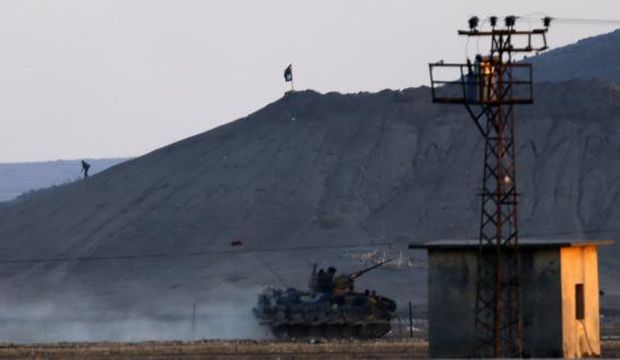
An Islamic State of Iraq and Syria (ISIS) fighter walks near a black flag belonging to the group as a Turkish army vehicle takes position near the Syrian town of Kobani, as pictured from the Turkish–Syrian border near the southeastern town of Suruç, Şanlıurfa province, Turkey, on October 7, 2014. (Reuters/Umit Bektas)
Mürşitpınar and Ankara, Reuters—US-led airstrikes on Wednesday pushed Islamic State of Iraq and Syria (ISIS) fighters back to the edges of the Syrian–Kurdish border town of Kobani, which they had appeared set to seize after a three-week assault, local officials said.
The town has become the focus of international attention since the Islamists’ advance drove 180,000 of the area’s mostly Kurdish inhabitants to flee into adjoining Turkey, which has infuriated its own restive Kurdish minority—and its NATO partners in Washington—by refusing to intervene.
ISIS hoisted its black flag on the eastern edge of the town on Monday but, since then, airstrikes have redoubled by a US-led coalition that includes Gulf states seeking to reverse the jihadists’ dramatic advance across northern Syria and Iraq.
Intense gunfire could be heard on Wednesday morning from across the Turkish border.
“They are now outside the entrances of the city of Kobani. The shelling and bombardment was very effective and as a result of it, ISIS have been pushed from many positions,” Idris Nassan, deputy foreign minister of Kobani district, told Reuters by phone.
“This is their biggest retreat since their entry into the city and we can consider this as the beginning of the countdown of their retreat from the area.”
ISIS had been advancing on the strategically important town from three sides and pounding it with artillery despite dogged resistance from heavily outgunned Kurdish forces.
Defense experts said it was unlikely that the advance could be halted by air power alone—a fact that left not only Washington but also the Syrian Kurds’ ethnic kin across the border demanding to know why the Turkish tanks lined up within sight of Kobani had not rolled across the frontier.
However, many Turks outside the southeast think it is far better to risk alienating the Kurds than be sucked into a ground war in Syria.
At least 12 people died and dozens more were injured on Tuesday as sympathizers of the outlawed Kurdistan Workers’ Party (PKK) clashed with police and Islamists in towns and cities across Turkey’s predominantly Kurdish southeast as well as in Istanbul and Ankara.
Authorities imposed curfews in five southeastern provinces and sent troops and tanks onto the streets of Diyarbakır, the largest Kurdish city in the region, to try to quell the unrest.
“We are here to protest too. This is repression, this is an insult to the Kurdish people,” said Ibrahim Oba, 54, who had traveled to the border near Kobani to join protests against Turkish inaction.
“If Turkey had intervened, this would not have happened, but they are just watching.”
An unnamed senior US official told the New York Times on Tuesday that there was “growing angst about Turkey dragging its feet to act to prevent a massacre less than a mile from its border.”
“This isn’t how a NATO ally acts while hell is unfolding a stone’s throw from their border,” the official said.
